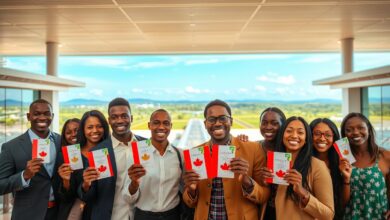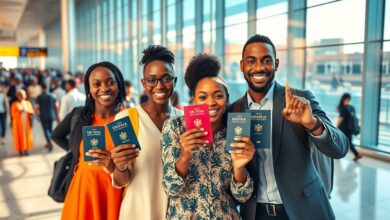Visa Sponsorship Singapore: Professional Opportunities for Nigerians
Singapore is a key business center with a constant need for skilled workers. This need is in areas like technology, healthcare, finance, and engineering. For Nigerians, getting an employer-backed visa to Singapore can be a great way to grow professionally and move to a new place.
This article will cover how Visa Sponsorship Singapore and Singapore job sponsorship work. It will also talk about which visas apply and what’s needed for Nigerian relocation to Singapore. You’ll learn about who can apply, the steps to apply, and which industries often hire foreign professionals.
There are tips on how to prepare your application, common issues, and where to find help. Companies like Michael Page and Robert Walters can offer support. The advice is based on the latest information from the Ministry of Manpower and Enterprise Singapore.
If you’re from Nigeria and thinking about moving to Singapore for work, read on. This guide will help you understand employer-backed visas in Singapore and plan your career move.
Introduction to Visa Sponsorship in Singapore
Visa sponsorship in Singapore means a local employer applies to the Ministry of Manpower for a foreign hire. The employer acts as sponsor and must meet regulatory obligations. This includes renewals, record keeping, and compliance with employment rules.
Understanding Visa Sponsorship
Employer-backed visas Singapore cover major work passes that match skills to visa types. Common routes include the Employment Pass, S Pass, and Work Permit. Each is aimed at different skill levels and sectors.
These passes differ from other immigration pathways Singapore offers. Paths like Dependent Passes, Long-Term Visit Passes, and Permanent Residence applications have their own rules and checks. Each path has its own eligibility and documentation.
Processing timelines vary by pass and employer readiness. The sponsoring company submits supporting documents and pays fees. They also stay responsible for the foreign worker while the pass is valid.
Importance of Visa Sponsorship for Foreign Workers
For many in the Nigerian workforce, Singapore is a top destination. Employer sponsorship is the most direct route to legal employment. A successful Sponsorship application Singapore often unlocks benefits such as access to family passes for certain visa holders.
Sponsorship means the employer will manage relocation logistics, onboarding, and compliance. This support reduces uncertainty. It helps the applicant focus on work and career growth.
Strict labor market tests and quota systems make employer relationships vital. For Nigerians seeking stable Immigration pathways Singapore, documented skills and a strong employer match improve approval chances. This also leads to long-term prospects.
Types of Visa Sponsorship Available in Singapore
It’s important for Nigerian applicants to know the visa options. Singapore offers different visas for various jobs. Each visa has its own rules about salary, qualifications, and family matters.
The visa choice depends on the job and experience. Employers check if the candidate fits the job and meets MOM’s rules. Nigerian professionals should look at each visa’s details to understand what it offers.
Employment Pass
The Employment Pass is for top professionals and managers. Employers apply for the visa on behalf of the candidate. MOM checks the salary, qualifications, and work history.
Applicants need a minimum salary and relevant skills or credentials. Those who get this visa can bring their families. They also have a better chance of getting permanent residence later.
Nigerians have a good chance of getting this visa from big companies like DBS, Grab, or Google. It’s important to match their experience with the job requirements.
S Pass
The S Pass is for mid-skilled workers with a lower salary requirement. It looks at work experience, qualifications, and the job role.
Employers must follow rules on quotas and levies for S Pass holders. Some may get family passes if they earn more.
Jobs in manufacturing, IT, and construction often need mid-level technical skills. This shows the demand for skilled workers in these areas.
Work Permit
Work Permits are for semi-skilled and unskilled workers. They are needed in construction, manufacturing, and some services. Domestic workers have their own rules.
The system is strict with rules on employer levies and quotas. Family reunification is harder compared to Employment Pass and S Pass.
Choosing the right visa is key for long-term plans and salary. Nigerian applicants should pick the visa that matches their skills and the job offer.
Eligibility Criteria for Visa Sponsorship
Getting a visa in Singapore starts with clear rules for employers and applicants. Companies must be registered in Singapore and follow MOM rules. Applicants need to meet pay standards, have the right qualifications, and pass health and character checks.
General Requirements
Employers must show their business is real and can sponsor foreign workers. This is crucial for Employer-backed visas in Singapore. They might need to explain why a local can’t do the job for some passes.
Applicants must earn enough and show their education or work experience. Medical and security checks are also part of the process.
Some visas have special rules, like sector-specific requirements or quotas. Employers must advertise jobs to locals first. Having all the right documents makes the application process smoother.
Specific Requirements for Nigerians
Nigerians moving to Singapore need certified education and work records. They often need to get documents apostilled or notarized for verification.
Health and engineering professionals need recognized licenses or memberships. Employers might ask for English skills for jobs that need a lot of communication.
Visa history and travel records matter for hiring. A clean immigration record helps. Nigerian applicants should check with the Singapore Embassy in Abuja or MOM for specific steps for Sponsorship applications in Singapore.
Popular Industries Offering Visa Sponsorship in Singapore
Singapore is a magnet for skilled workers in many fields. Employers use job sponsorship to fill gaps where local talent is lacking. Knowing which sectors need foreign workers helps Nigerian applicants find the best opportunities.
Technology
The tech sector is booming, with jobs like software developers, data scientists, and cybersecurity specialists. Big names like Google and Amazon Web Services often sponsor international hires. These roles are in high demand.
Employers look for a strong technical background and cloud certifications. Showing measurable project impact is key. Those who meet these criteria have a better shot at job sponsorship and career growth in Singapore.
Healthcare
Hospitals and clinics need doctors, nurses, and biomedical researchers. Before starting work, you must register with the Singapore Medical Council or Allied Health Professions Council.
When there’s a shortage, employers sponsor qualified candidates. You might need to have your credentials recognized or pass local exams. This shows the demand for skilled workers in healthcare.
Engineering
Civil, mechanical, and electrical engineers are crucial for projects in infrastructure and manufacturing. Companies in these fields sponsor engineers through S Passes or Employment Passes based on salary and role.
Having professional credentials like UK-SPEC recognized degrees helps. Matching your experience to the job increases your chances of getting sponsored. This is key for career growth in Singapore.
- Finance, logistics, and hospitality also offer opportunities for foreign hires.
- Nigerian professionals should align their skills with sector needs for better chances in Singapore.
- Strong portfolios and relevant certifications are crucial for meeting Singapore’s skilled worker demand.
Application Process for Visa Sponsorship
Starting your journey in Singapore involves clear steps and the right paperwork. Nigerians looking to work in Singapore need to follow a specific path. This guide will walk you through the necessary steps and documents for a successful Sponsorship application Singapore.
Steps to Apply for the Pass
1. First, get a job offer from a Singapore-registered employer who will sponsor your visa. The employer must give you a detailed contract or offer letter.
2. The employer then applies online through the Ministry of Manpower’s systems. This includes EP Online for Employment Pass or the Work Pass system for S Pass and Work Permit.
3. After getting an in-principle approval, you might need to do medical exams, tuberculosis screening, and get police clearance certificates.
4. Once approved, the employer gives you an In-Principle Approval letter. You then complete entry formalities like fingerprinting and prepare to travel.
5. Upon arrival, you register with the Ministry of Manpower to get your physical pass. You also submit applications for dependent passes if needed.
How long it takes depends on the pass type and how complete your documents are. Employment Pass cases can take weeks to months if extra checks are needed.
Required Documentation
You’ll need a valid passport, degree certificates, academic transcripts, and employment reference letters on company letterhead. Also, have an updated CV and a formal job offer or contract.
Employers need to show business registration, why they’re sponsoring a foreign worker, and proof of quota or levy compliance for S Pass or Work Permit.
For certain professions, you might need professional licenses, police clearance certificates, marriage or birth certificates for dependents, and medical reports for health clearances.
Some foreign documents might need notarization, consular legalization, or an apostille. If documents aren’t in English, you’ll need certified translations.
Here are some tips: make sure your documents are complete and authentic to avoid delays. Keep in touch with your employer during the IPA stage. Also, stay updated with Immigration pathways Singapore on official channels for the latest information on forms and fees.
Tips for a Successful Visa Application
Planning carefully can make the Sponsorship application Singapore process smoother. It’s important to research employers, prepare your documents well, and talk clearly about your relocation needs. These steps help achieve your job sponsorship goals and support your plans to relocate to Singapore.
Researching Potential Employers
Look for employers who have hired foreign professionals before. Check if they are registered and have job listings that mention sponsorship. Use Glassdoor and LinkedIn to learn about their culture and how responsive their recruiters are.
Focus on big companies and those in high-demand fields. These companies usually have clear HR processes that make visa applications easier. Reach out to recruiters at Michael Page or Hays for advice on jobs that fit your skills.
Also, join virtual career fairs to meet Singapore employers. Ask about relocation support, family assistance, and salary ranges. Asking the right questions can avoid surprises during the application process.
Preparing a Strong CV
Make a CV that is short, focused on results, and follows Singapore’s hiring standards. Start with a strong summary, list your achievements, and highlight your technical skills. Keep your education and certifications brief.
Emphasise your international experience, English work history, and relevant certifications. Mention any knowledge of regulations or regional markets. Include your employer’s contact info and exact dates for reference letters to speed up verification.
Be honest and consistent in your CV, reference letters, and application. Any discrepancies can slow down or even block your application. Write a professional cover letter and practice your interview skills for both online and in-person meetings.
When talking about relocation, be realistic about your timelines and salary expectations. Clear, documented answers will make you more credible and increase your chances of career growth in Singapore.
Challenges Faced by Nigerian Job Seekers
Many Nigerian job seekers dream of Singapore’s steady jobs and fast career growth. But, the reality can differ. Knowing common misconceptions and legal and cultural barriers helps set realistic goals for moving to Singapore.
Common Misconceptions
Some think any job offer means they’re in. But, the Ministry of Manpower checks salary, qualifications, and role seniority. A good match between the job and the applicant is key.
Others believe all employers sponsor foreign hires. But, small and medium firms might not have the budget. It’s wise to check an employer’s history before trusting sponsorship promises.
Many expect employer sponsorship leads to permanent residency. But, the Immigration & Checkpoints Authority has its own rules for PR. Candidates should plan for PR as a separate, often longer, process.
Legal and Cultural Barriers
Applicants face legal hurdles like sector-specific quotas for S Pass and Work Permit holders. Levies and the fair consideration framework can limit certain roles.
Getting credentials verified can be extra work. Some Nigerian degrees or certificates might need checks or translations for regulated jobs. Missing documents can lead to visa denials.
Cultural barriers include workplace norms like punctuality, hierarchy, and direct communication. Adapting quickly to these norms helps with team integration and performance.
- Pre-verify and certify academic and employment documents.
- Obtain professional translations when needed.
- Seek mentorship from Nigerian professionals already working in Singapore.
- Research employer sponsorship history before accepting offers.
Dealing with legal and cultural barriers early makes moving to Singapore easier. A clear understanding of the job market in Singapore helps applicants plan better. This increases their chances of success.
Support Services for Nigerian Applicants
Getting a job and visa can be tough. Support services help Nigerian applicants find jobs, prepare documents, and learn about Singapore’s rules. They offer practical advice to speed up the process and avoid mistakes.
Recruitment agencies in Nigeria
Jobberman, Michael Page, and Robert Walters list jobs with Singapore sponsors. Smaller agencies focus on certain sectors. It’s important to know the fees and services they offer.
Good agencies help with CVs, interviews, and meeting employers. They guide the visa application process but don’t issue visas. Check if they are registered, ask for references, and read reviews before choosing.
Online resources and forums
The Ministry of Manpower and Immigration & Checkpoints Authority have useful information. They explain what you need for a visa application in Singapore.
LinkedIn and meetup groups offer job tips and advice. Forums like ExpatForum and Reddit’s r/singapore share experiences. Facebook and WhatsApp groups for Nigerians in Singapore provide local tips.
- Use webinars and virtual job fairs to meet employers.
- Take industry courses on Coursera or Udacity to bridge skill gaps.
- Confirm any agency or adviser provides written contracts and references.
Using Recruitment agencies Nigeria Singapore and online resources is a smart strategy. It helps with the practical and administrative steps of moving to Singapore.
Real-Life Success Stories
Nigerian professionals share their paths to securing job sponsorship in Singapore. They talk about tech workers, nurses, and engineers. Their stories show how hard work and focus can lead to success abroad.
Inspiring Interviews with Nigerian Professionals
A software engineer focused on his CV. He made sure it met Singapore’s standards. He also highlighted his certifications and reached out to hiring managers.
This approach caught the attention of employers. Soon, he got an Employment Pass offer. His story is a guide for career growth in Singapore.
A nurse talked about getting her credentials recognized. She passed local exams and got a hospital to sponsor her. She also did a supervised placement.
Her patience and thorough documentation were key. She also used mentorship to learn about clinical protocols.
An electrical engineer highlighted his skills in power systems and automation. He did remote interviews and showed his engineering projects.
He found a company willing to sponsor his stay. This shows how important it is to have in-demand skills.
“Focus on what the employer needs, not just what you want. Show how your skills solve immediate gaps and you increase your chances of securing sponsor support,” a professional advised.
Contributors to the Community
Community groups and institutions help newcomers. Nigerian associations, university mentorship, and groups like the Singapore Computer Society offer support.
These resources help newcomers integrate faster. They provide orientation and networking events. This support is crucial for career growth in Singapore.
- Peer mentorship programs pair newcomers with experienced professionals for job hunting tips and cultural guidance.
- Community-run workshops explain MOM procedures, credential recognition, and housing options.
- Volunteer initiatives help families with schooling choices while newcomers pursue Singapore job sponsorship.
Those who benefited often mentor others. They share interview tips and résumé templates. This helps build a strong talent pipeline.
This cycle of support expands job options in Singapore. It also raises the profile of the Nigerian workforce in local industries.
The Impact of Visa Sponsorship on Career Growth
Visa sponsorship opens doors to focused skill building and broader professional networks. Many employers in Singapore pair sponsored roles with formal training, mentorship, and project exposure. This speeds up career advancement.
Skills Development Opportunities
Employer-sponsored positions often include sponsored certifications, on-the-job coaching, and access to courses at top universities. These options help workers gain practical skills in fintech, artificial intelligence, and biomedical research.
Working with multinational teams and on regional projects builds technical depth and soft skills. Taking part in events like the Singapore FinTech Festival increases visibility and creates contacts for long-term advancement.
Long-term Residency Prospects
Employment Pass holders with steady employment and rising earnings have stronger cases for Permanent Residence. Documented contributions to a company and sector enhance long-term residency prospects in Singapore.
S Pass and Work Permit holders face a different path. Some transition to Employment Pass status before seeking PR. Strategic moves like higher pay, promotions, and roles in high-demand fields improve chances.
Practical steps include discussing career plans with employers, choosing roles with clear promotion tracks, and keeping records of achievements. This supports future Immigration pathways Singapore applications.
- Build a track record of results and increased remuneration.
- Target roles tied to Skilled worker demand Singapore sectors.
- Document training, certifications, and project impact for PR applications.
Conclusion: Embracing Opportunities in Singapore
Singapore is a great place for Nigerian professionals looking for work with employer support. There’s a steady need in tech, healthcare, and engineering for Visa Sponsorship Singapore. New fields like green tech and advanced manufacturing also offer chances for Nigerian relocation Singapore, if skills match the market.
The Future of Visa Sponsorship for Nigerians
Changes in policy at the Ministry of Manpower can affect who gets visas and how much they need to earn. So, it’s important to keep an eye on MOM announcements. With sector incentives and changes in quotas, there will be more job opportunities in Singapore, especially for those with technical skills and certifications.
Encouragement for Prospective Applicants
To increase your chances, make your CV fit Singapore’s standards, check your documents, get recognized certifications, and use job agencies or LinkedIn. With these steps and support from your community, you’re more likely to get a job in Singapore and relocate successfully.
With the right preparation and realistic goals, Nigerian professionals can find good job opportunities in Singapore. By staying updated and aiming for well-known employers, you can secure a long-term job and residency in Singapore.
FAQ
What is visa sponsorship in Singapore and how does it benefit Nigerian professionals?
Visa sponsorship in Singapore means a local employer applies to the Ministry of Manpower (MOM) to hire a foreigner. For Nigerian professionals, this can lead to legal work, career growth, and even long-term residency. It also shows the employer’s commitment to helping with relocation and following rules.
Which employer-backed passes are most relevant for Nigerian job seekers?
The key passes are the Employment Pass for skilled workers, the S Pass for mid-skilled roles, and Work Permits for semi-skilled jobs. The right pass depends on the job’s level, salary, and qualifications. Employment Pass holders might have better chances for family support and permanent residency.
What are the general eligibility requirements for an Employment Pass or S Pass?
Employers need to be registered in Singapore and willing to sponsor. Applicants must meet salary and qualification standards. MOM checks the job, pay, and applicant’s background. S Pass employers must also follow quota and levy rules.
Are there Nigeria-specific document or verification requirements?
Nigerian applicants need verified academic records, employment references, and sometimes legalized documents. Certain professions might require local licenses or exams. A clean travel and visa history helps, and applicants should check with the Singapore High Commission in Abuja or MOM for specific requirements.
Which industries most frequently sponsor foreign talent in Singapore?
Tech, healthcare, and engineering are top sectors for sponsorship. Finance, logistics, and advanced manufacturing also hire skilled workers. Multinational and established employers often sponsor Nigerian professionals.
How does the application process for employer sponsorship work?
Employers apply online to MOM after offering a job. If approved, the applicant does medical checks and police clearances. Once approved, the pass is issued, and the employee registers upon arrival. Times vary based on the pass and documentation.
What documents are typically required for a visa sponsorship application?
You’ll need a valid passport, degree certificates, transcripts, and job offer. Employers must provide business details and proof of compliance. Additional items include professional licenses, police clearances, and certified documents.
How can Nigerian candidates improve their chances of securing sponsorship?
Target employers known for hiring foreigners. Tailor your CV and cover letter to Singapore standards. Highlight achievements and certifications. Use recruitment agencies, attend job fairs, and network on LinkedIn. Complete and verified documents speed up the process.
What common challenges do Nigerian job seekers face when pursuing sponsorship?
Challenges include strict MOM criteria and credential verification. Cultural adaptation and misconceptions about sponsorship can also be hurdles. Preparation and employer support are key to overcoming these challenges.
Can sponsored workers bring family members to Singapore?
Employment Pass holders can apply for Dependant’s Passes for family. S Pass holders might also qualify for family passes. Work Permit holders have limited options. Family eligibility depends on the pass and MOM requirements.
How does employer sponsorship affect long-term residency prospects in Singapore?
Long-term employment under an Employment Pass can lead to Permanent Residence. S Pass and Work Permit holders need career advancement to improve residency chances. Documenting achievements is crucial.
Where can Nigerian applicants find reputable recruitment and support services?
Look for recruitment firms like Michael Page and Robert Walters. Local platforms like Jobberman may list international roles. MOM and ICA offer official guidance. Community networks like LinkedIn groups and forums provide practical advice.
What are practical tips for interviews and relocation discussions with Singapore employers?
Prepare a concise CV and tailored cover letter. Research the employer’s sponsorship history. Practice interview etiquette and discuss salary and relocation logistics early.
How long does it usually take to get an Employment Pass decision from MOM?
Processing times vary. Employment Pass applications can take weeks, while complex cases may take longer. Submitting complete documents helps avoid delays.
If a sponsorship application is denied, what options are available?
Employers can ask MOM for clarification or provide more evidence. Candidates might look for alternative roles or apply for different passes. Recruitment agencies or immigration specialists can help with next steps.
Are there costs candidates should expect during the sponsorship process?
Employers pay MOM fees, but candidates may face costs for document verification and medical exams. Recruitment agencies should disclose fees upfront. Clarify costs with the employer and keep receipts for verifications.
How can Nigerian professionals maintain compliance after arrival in Singapore?
Sponsored workers must follow pass conditions, maintain employment, and notify MOM of changes. Keep documents up to date, attend medical screenings, and follow local laws to avoid penalties.
What emerging sectors in Singapore may create more sponsorship opportunities for Nigerians?
Growing sectors include green tech, advanced manufacturing, digital services, AI, and fintech. Nigerian professionals with skills in cloud computing, AI, and renewable energy have good sponsorship chances.
Where can applicants find official, up-to-date information about visa sponsorship rules?
MOM Singapore and ICA websites offer the latest on pass criteria and application procedures. Employers and applicants should check these sources for policy updates and guidance.





